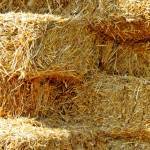Feeding Old Hay

Hay that is stored properly (kept dry, shielded from dirt and direct sunlight, protected from animal urine and feces) retains most of its nutrients fairly well. An exception is vitamin E, which is lost quickly with exposure to sunlight. Mowed hay that has dried in the field has already lost of up 90% of its vitamin E content by the time it is baled. More vitamin E is lost even with proper storage, and hay that is a year or two old contains almost no vitamin E. Because this nutrient is essential for healthy nerve function and other metabolic processes, consider supplementation for horses that do not have access to fresh pasture or new hay.








